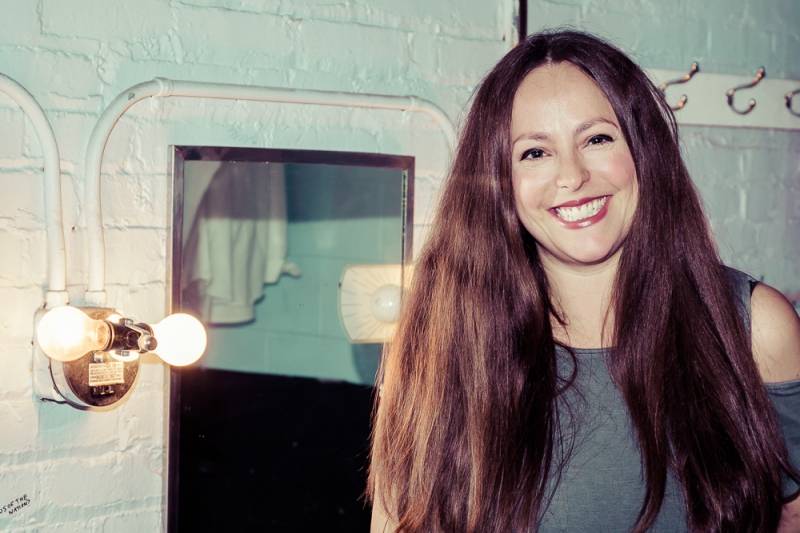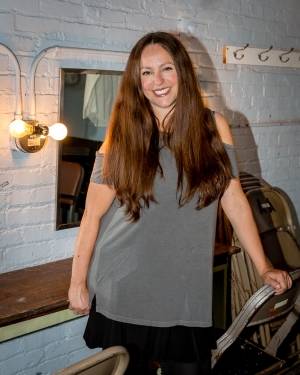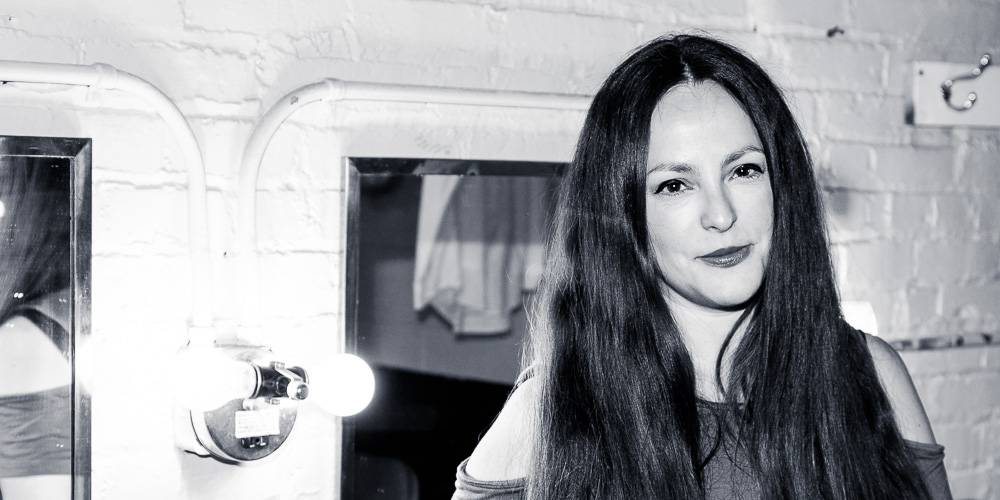Spotlight Backstage is a new endeavor by SP Arts to shine a light where it’s rarely seen in local theatre, despite the fact that these people intentionally wear black in order to escape notice. Still, stage productions stand on the back of tireless tech crews, and even more, once you start talking with “theatre folk”, directors and actors will actively bring up names with the descriptors “genius”, “amazing”, and “integral”. We thought we’d take some time to get to know these necessary and talented support staff, and give our readers a chance to really understand what it takes to make theatre happen.
For our second installment, choreographer Whitney Havice was another must-have on our list. There’s hardly a musical production in town that does not have her name attached, so we wanted to take a moment from her very busy schedule and see what motivates this very hard-working, yet nearly invisible, creative contributor. Rebecca Knaur got a chance to sit down and talk with this in-demand choreographer and shine the spotlight backstage.

SP: What exactly is a choreographer’s job within a production?
Havice: My job in a production is to realize the vision of the director and bring the show itself to life through movement and dance set on the cast members in specific numbers.
SP: What are the unnoticeable tasks for a choreographer to successfully complete in order to support the visibly appreciable work happening before an audience?
Havice: Spending hours upon hours of time creating movement and dance for the numbers in the show that the director gives me; creating, finessing, and fine-tuning that movement and dance to showcase the cast members and also give just due to the music and story; teaching the dance and movement to the cast in multiple rehearsals (not to mention making a rehearsal schedule-oy) and pushing them beyond their comfort zone to achieve the warranted emotion and execution needed. I should also add numerous hours of worry, fretting, and second-guessing my decisions.
SP: “The most famous choreographer” is likely a question up for debate, but for you, who is the epitome?
Havice: Wow, this is a hard to give just one answer to! I would have to say that the epitome for me would be Bob Fosse.
SP: Is that choreographer also the most influential to you, or have others inspired your work? (if so, who?)
Havice: I would say yes, but also with a splash of Agnes DeMille and Jerome Robbins and modern influences such as Sonya Tayeh and Ryan Heffington.
In addition, I’m constantly drawing from how the world moves in general…sometimes I encounter people who are so adverse to the word “dance” in my work, to the point where they freeze when they feel that they are “formally dancing.” We all move, and there is grace and beauty and feeling behind each moment of that movement. And emotion-dance tells a story. Dance encompasses the emotion of life.
SP: What made you decide to pursue this line of work?
I think my parents made this decision for me by enrolling me in a local dance studio when I was six — thanks, Mom and Dad! Dance has never really been a question for me, but rather a state of being. For as long as I can remember, my body and mind feel at their best when they’re in motion. For as long as I can remember, I’ve always been creating stories with movement to music, whether in my head or setting it on other people.
SP: Is this how you make your living now?
Havice: While choreography is not my day job, it is my evening/weekend job that can be a nice supplement to my day job.
SP: How long have you been a choreographer and at what theatres (with what production companies) have you worked?
Havice: I’ve been choreographing officially for about a decade now. I’ve worked with several local theatre companies: CUTC, the Station Theatre, Parkland College, Twin City Squared, Armory Free Theatre, area high schools and middle schools, the Brown Paper Box Co. in Chicago, ISYM Musical Theatre Camp, and I’ve worked with the Lyric Opera at the UI as their dance rehearsal director. I’ve also taught musical theatre dance classes.
SP: How many shows have you done?
Havice: Way too many to officially count, but I’ve choreographed at least 30ish. Probably more.
SP: As a choreographer, when can you tell you’re doing your job the right way? What kinds of mistakes have you made in the process of learning?
Havice: I can tell that I’m doing my job the right way if the cast members are able to connect with what I give them…even if they don’t on the first go-round. If I’m able to draw the emotion behind the movement from them, I feel it’s a success. As far as mistakes, I learn every day along with my cast-every show is a learning process, and no process is perfect. Also, I feel that I should mention that time signatures are the bane of my existence and are usually evil.
SP: What are some of a choreographer’s biggest challenges that might not be apparent to a non-dancer watching from the audience?
Havice: Drawing self-proclaimed non-dancers out of their shells and making them comfortable moving onstage; spending hours pouring over lyrics, the score, and the story to find movement that makes sense and that is achievable by the cast, emotionally and physically. Hours of worry and self-criticism.
SP: When you are choreographing, where do you get your inspiration?
Havice: Most often from the cast and the dancers themselves. I love pushing them beyond boundaries that they have put up around themselves and showing them that they have abilities they have told themselves that they can’t possibly hold. I will often mold my choreography to best showcase them.
SP: Do you have any personal favorite or least favorite experiences as a choreographer?
Havice: My favorite experiences as a choreographer are when, years later, a cast member will say to me…”Hey, remember when you made me stand on my head? Remember when you choreographed that piece that had no music? Remember when you pushed me to do this and I never thought that I could?” It shows that I made a mark on their lives through dance as a medium, and I think so many people shut themselves off to that. My least favorite experiences…I don’t like to dwell on them, but there have been a few times that I just didn’t connect to the material or the cast and the whole process felt like a struggle for the wrong reasons. It hasn’t happened often, but when it does, it’s hard not to take on a defeatist attitude and throw your hands up and say, “Oh, well….let’s just dial it in and do some jazz squares.” By the way, I’ve never actually done this.
SP: OK, best show you ever choreographed? Same question, but limited to C-U?
Havice: Wow. Um. I don’t know about “best,” buuuuuut I have lots of favorite numbers from shows that I’ve done. Pippin and Bloody Bloody Andrew Jackson are definitely up there. Certain numbers from American Idiot, Jesus Christ, Superstar, Reefer Madness and Once On This Island are up there, too. There’s too many!
 SP: What are some common misconceptions people have regarding choreographers?
SP: What are some common misconceptions people have regarding choreographers?
Havice: That we’re mean and judgmental and won’t give “non-dancers” the time of day. I actually try to be a very nice and sympathetic person, so when someone comes into a rehearsal or an audition with a chip on their shoulder because they think I’m going to automatically dismiss them, it kind of hurts my feelings and turns me off.
One of my biggest pet peeves is when people come into a rehearsal and start off by saying “This is over my head” or “I’m not a dancer” or “I apologize in advance.” That last one burns me the most…don’t tell me that you’ve already decided what you’re capable of, because oftentimes you’re capable of so much more than you think. I can tell if you have self-confidence issues, I can tell if you don’t have technique training, I can usually tell what your body can handle within the first few seconds of watching you. Do you. Let me do the rest. Feel the joy in your body when you dance…don’t automatically turn on that self-loathing switch.
SP: Why do you think choreographers are overlooked when it comes time to interview folks producing a show?
Havice: I sometimes think that choreographers get overlooked because they aren’t seen as the “meat” of the show process….many times I think this is also sadly a case sometimes of people who aren’t familiar with the dance world avoiding it like the plague because they’re afraid that they aren’t familiar enough with the “vernacular” to connect to a choreographer.
SP: What about the job rewards you most?
Havice: Pushing people beyond the limits of what they thought their bodies were capable of.
———
Whitney is currently in the middle of the rehearsal process for Bat Boy, the musical which will be opening at the Station Theatre on July 16th. You can see the fruits of her labor there, although I’m sure there will be no spotlight backstage there.
About Rebecca Knaur…
As Arts Editor for Smile Politely, rebecca gets the chance to talk with all kinds of interesting people. Coincidentally, she also feels that time signatures are evil, especially 7/4, seriously, what is that. For other random rants similar to the preceding statement, follow her on Twitter @rknaur.
All images by Scott Wells…
Scott is a U.S. Navy veteran and a graduate of the University of Illinois. He has been a photographer and writer for Smile Politely since March of 2015.









 About Rebecca Knaur…
About Rebecca Knaur… Scott is a U.S. Navy veteran and a graduate of the University of Illinois. He has been a photographer and writer for Smile Politely since March of 2015.
Scott is a U.S. Navy veteran and a graduate of the University of Illinois. He has been a photographer and writer for Smile Politely since March of 2015.